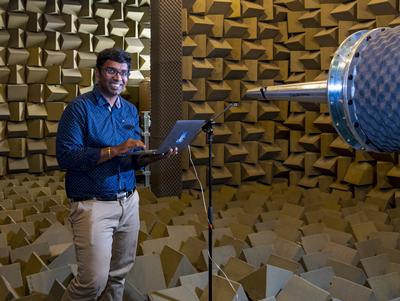Southampton engineer awarded prestigious fellowship to speed the development of low-noise technologies

Acoustics engineer Dr Chaitanya Paruchuri from the University of Southampton will analyse and address noise pollution from ducted fans in a new Research Fellowship from the Royal Academy of Engineering.
The five-year fellowship will collaborate with international industry partners to help optimise technologies ranging from large aircraft aero-engines to small industrial fans.
Chaitanya, a member of the University’s renowned Institute of Sound and Vibration Research (ISVR), will advance the research using facilities including Southampton’s brand new anechoic open jet wind tunnel, the largest facility of its kind in the UK.
“Noise emitted from ducted fans in aero-engines, marine propellers, unmanned aerial vehicle (UAV) rotors and industrial ventilation fans is a major environmental concern,” Chaitanya explains. “Fan noise is often a significant obstacle for the expansion of airport traffic, while the demand for UAVs and marine transportation is only expected to increase with time.
“There is much evidence to suggest that one of the important noise sources in these cases is generated by an unsteady flow in the gap between the fan and the duct wall, which is a lesser understood source due to its complexity. This new, predominantly experimental research will seek to understand, quantify and characterise the mechanisms of the noise generated at the tip of a ducted fan in a more comprehensive manner.”
Aviation targets for 2020 and 2050 aim to reduce noise by 50% and 65% respectively, however these are unlikely to be achieved unless noise from tip leakage flow is reduced. Tip leakage is also likely to be a substantial noise source in machines such as ducted industrial fans, electric vertical take-off and landing (eVTOL) crafts and ducted drones. The new research will help address these issues and trigger advances in associated technologies while also adhering to environmental regulations and standards.
Chaitanya will work with researchers at the University of Cambridge and partners including Rolls-Royce, Dyson and the Defence Science and Technology Laboratory (DSTL) throughout the project.
Royal Academy of Engineering (RAEng) Research Fellowships are designed to advance excellence in engineering by enabling early-career researchers to concentrate on basic research in any field of engineering. Awardees also receive mentoring from experienced Academy Fellows, providing valuable advice and industry links that will enable the researchers to establish themselves as future leaders in their fields.
Chaitanya is one of 18 RAEng Research Fellowships announced across the UK this week, which also includes Dr Eric Numkam Fokoua from Southampton’s Zepler Institute for Photonics and Nanoelectronics.
Chaitanya has amassed specialist expertise in the field of aero-acoustics since graduating from the Indian Institute of Science, Bangalore, in 2010. His journey has included a spell with General Electric (GE) Aviation and a PhD at the ISVR’s Rolls-Royce University Technology Centre (UTC) focussing on an innovative re-design of aerofoil shape.
“I am extremely humbled and thrilled to receive this prestigious fellowship as it can be regarded as a once in a lifetime opportunity,” he says. “It has been truly gratifying to find my efforts and achievements being recognised and this only motivates and fuels my passion all the more to help address one of the key environmental issues of noise pollution.”